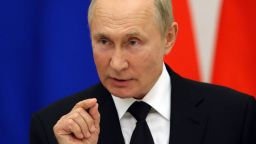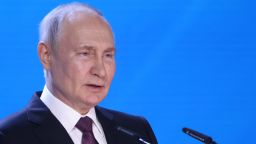Russia could place powerful strategic nuclear weapons in Belarus, on top of the tactical nuclear warheads Moscow is already planning to deploy there, Belarusian President Alexander Lukashenko said during a national address on Friday.
Russian President Vladimir Putin announced last week that Moscow would complete the construction of a storage facility for tactical nuclear weapons in Belarus by the beginning of July. After days of silence, Lukashenko welcomed the move on Friday, announcing he had intensified talks with Putin about deploying both tactical and strategic nuclear weapons in the country.
The mentioning of strategic nukes is an escalation in rhetoric from Lukashenko. While tactical warheads are designed for use in a limited battlefield, for example to destroy a command post or a column of tanks, strategic nuclear warheads are designed to destroy entire cities. Russia has not announced any plans to send strategic nuclear weapons to Belarus.
Lukashenko, who has been asking Putin for nuclear weapons for a while, claimed Belarus needed the weapons because Ukraine’s Western allies were planning a coup against him. He baselessly accused Western countries of “preparing to invade” Belarus from Poland and “destroy” it.
“If necessary, Putin and I will decide and introduce strategic nuclear weapons here. And they must understand this … We will stop at nothing, protecting our countries, our states and their peoples,” the Belarusian leader was quoted as saying by state media BELGA.
The two leaders are scheduled to meet next week.
Belarus opposition leader Sviatlana Tsikhanouskaya told CNN on Monday that Russia’s decision to station tactical nuclear weapons in its neighbor “aims to subjugate Belarus.”
“We are not a nuclear country and we don’t want to deploy nuclear weapons in our state,” she said, adding that the decision violates Belarus’ constitution.
Belarus is one of Russia’s few allies in its war on Ukraine. While the country’s military isn’t directly involved in the fighting, Belarus helped Russia launch its invasion of Ukraine in February 2022, allowing the Kremlin’s troops to enter the country from its territory.
Putin said last week that Moscow has already transferred an Iskander short-range missile system to Belarus. The device can be fitted with nuclear or conventional warheads. However, the Russian leader said he would not transfer control of the tactical nuclear weapons to Lukashenko, likening the move to Washington’s practice of stationing nuclear weapons in Europe to keep host countries, like Germany, from breaking their commitments as non-nuclear powers.
“Our converted planes can also carry a nuclear warhead. You heard from the president of Russia about joint plans to create the appropriate infrastructure on the territory of Belarus. I just want to clarify: The entire infrastructure has been created and is ready,” Lukashenko said.
Lukashenko said that Minsk and Moscow would make “every effort and use the means to ensure their sovereignty and independence.” He specifically accused Poland and its “zealous” Western neighbors of building up the “formation of certain regiments, banners, legions” for a “subsequent coup in Belarus.”
Speaking to the nation on state TV, Lukashenko also called for the freezing of “hostilities” in Ukraine.
“It is necessary to stop hostilities and declare a truce that prohibits both sides from moving groups of troops and from transferring weapons, ammunition, manpower, and equipment. All stopped, frozen,” Lukashenko said.
However, both Russia and Ukraine immediately rejected the proposal.
Senior Ukrainian Presidential Adviser Mykhailo Podolyak said there cannot be a ceasefire while Russian forces continue to occupy Ukrainian territory.
“Any ceasefire will mean [the Russian Federation’s] right to stay in the occupied territories. This is totally inadmissible,” Podolyak said.
The Kremlin also ruled out the proposal on Friday. “In the context of Ukraine, nothing changes. The special military operation continues because at the moment it is the only way to achieve the goals that our country faces,” Kremlin spokesman Dmitry Peskov said in a regular call with journalists, referring to the invasion by the Russian propaganda phrase.
But while he called for a truce, Lukashenko added a warning to the West that Moscow would be obliged to use the “full power of its military-industrial complex and the army to prevent the escalation of the conflict – phosphorus ammunition, non-depleted uranium, and enriched uranium – everything must go into action if there is deception and even the slightest movement across the border of Ukraine is noticed.”






